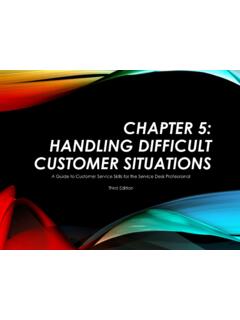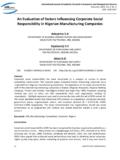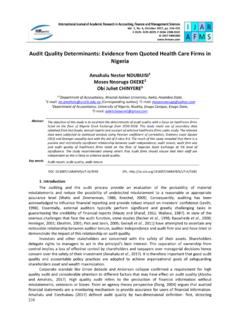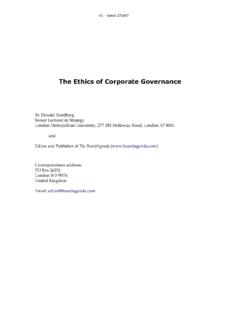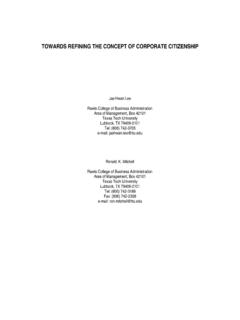Transcription of Comparison of Servant Leadership and Stewardship
1 Comparison of Servant Leadership and Stewardship w w w . l e a d-i n s p i r e . c o m J u n e 2 0 0 9 Andrew J. Marsiglia, PhD, CCP The moral and social responsibility of Leadership is important to the development of successful Servant - Leadership and Stewardship . The role of ethics in Leadership , business, and economics is shown to the foundation of successful Servant - Leadership . In addition, these Leadership orientations are shown to produce organizations with longevity and profitability. Integral to Stewardship and organization success is moral Leadership and organizational integrity. The skills, competencies, and behaviors essential to moral Leadership are presented as well as how they must be applied to an individual in order to be effective in the new business paradigm. | Servant Leadership and Stewardship 1 Abstract The moral and social responsibility of Leadership is important to the development of successful Servant - Leadership and Stewardship .
2 The role of ethics in Leadership , business, and economics is shown to the foundation of successful Servant - Leadership . In addition, these Leadership orientations are shown to produce organizations with longevity and profitability. Integral to Stewardship and organization success is moral Leadership and organizational integrity. The skills, competencies, and behaviors essential to moral Leadership are presented as well as how they must be applied to an individual in order to be effective in the new business paradigm. | Servant Leadership and Stewardship 2 Comparison of Servant Leadership and Stewardship Andrew J. Marsiglia, PhD, CCP June 2009 The acts of a leader affect other people more than the actions of other people affect the leader. This being the case, it seems reasonable to assume that if the leader is moral then his actions will be moral relative to his standards of moral behavior. The ethical orientation of the leader, therefore, is a key factor in promoting Servant - Leadership and Stewardship among organization members.
3 Successful leaders infuse managerial balance with economic outcomes and establish organizational values, corporate goals, and a firm mission statement that meld the organization s values and goals. In making decisions, the leaders will recognize the moral problem, apply moral reasoning, and exhibit moral character, or integrity, in their actions. The result is trust and commitment from organization members. Contemporary leaders must be focused on teamwork and community. They must seek to involve others in decision-making and must be oriented toward ethical and caring behavior. Furthermore, leaders of the 21st century should be cognizant of the need to enhance the personal growth of workers while improving the quality of our institutions (Spears & Lawrence, 2002). These goals may be attained through successful implementation of Servant - Leadership and Stewardship . Leadership Perspectives General Leadership The perspective of this analysis is oriented toward Leadership in its general form as well as its Servant - Leadership and Stewardship dimensions, and their moral-ethical aspects.
4 Bass (1990) | Servant Leadership and Stewardship 3 provides a practical definition of Leadership : Leadership is an interaction between two or more members of a group that often involves a structuring or restructuring of the situation and the perceptions and expectations of the members. Leaders are agents of change persons whose acts affect other people more than other people s acts affect them. Leadership occurs when one group member modifies the motivation or competencies of others in the group. (p. 19-20) The key characteristic of this Leadership definition is that the acts of leader affect other people more than the actions of other people affect the leader. This being the case, it seems reasonable to assume that if the leader is moral then his or her actions will be moral relative to his standards of moral behavior. Carlson and Perrewe (1995) state, The ethical orientation of the leader is considered a key factor in promoting ethical behavior among employees (p.)
5 830). In addition, Bennis and Goldsmith (1997) declare, Leaders are responsible for the set of ethics and norms that govern the behavior of the people in the organization (p. 135). Moral Leadership Bennis and Goldsmith (1997) state, This three-legged stool upon which true Leadership sits ambition, competence, and integrity must remain in balance if the leader is to be a constructive force in the organization rather than a destructive achiever of her or his own ends (p. 3). Integrity and ethics appear to be a leader s standards of moral behavior that enable him to conduct his activities in such a way that his decisions produce results that are right, just, and fair and minimizes harm to others. The leader s moral standards are a manifestation of his personal goals, norms, beliefs, and values as framed by his religious-cultural traditions and economic-social situations (Hosmer, 2003). Therefore, a practical definition of moral Leadership | Servant Leadership and Stewardship 4 may be submitted as: Moral Leadership is an interaction between two or more members of a group that often involves a structuring or restructuring of the situation and the perceptions and expectations of the members relative to the values, beliefs, norms, and ideals that are imbedded in their culture.
6 Servant - Leadership Moral Leadership appears to be the foundation to Servant - Leadership . Servant - Leadership should become more common in the 21st century as organizations abandon the traditional command-and-control structure and favor a more open, democratic management approach. Spears and Lawrence (2002) posit that Servant - Leadership is a form of Leadership , .. based on teamwork and community, one that seeks to involve others in decision making, one strongly based in ethical and caring behavior, and one that is attempting to enhance the personal growth of workers while improving the caring and quality of our many institutions. ( ) Stewardship Stewardship is the behavior of responsibly managing another person or organization s assets that have been entrusted to one s care. Two Stewardship perspectives are being addressed in this analysis. One is from Davis, Schoorman, and Donaldson (1997) in which they posit that Stewardship as a Leadership behavior leads to successful organizational performance and generally satisfies most of the organization s stakeholders.
7 The other perspective is that of Block (1993) who posits Stewardship as a form of governance that will produce organizational success by redistributing power, purpose, and wealth. | Servant Leadership and Stewardship 5 Agency Relationship and Stewardship Davis, Schoorman, and Donaldson (1997) present Stewardship in terms of agency relationship in order to clarify our understanding of the relationship between a subordinate s psychological attributes and the organization s situational characteristics. An agency relationship assumes a principal-subordinate relationship where the subordinate is entrusted with a person or organization s assets. Traditional agency theory depicts the subordinate as exhibiting individualistic behavior that diverges from the interests of the principal in order to maximize the subordinate s utility. According to Davis (1997), the most common way to minimize principal-agent divergence is to introduce a set of control mechanisms that are oriented toward proper monitoring and a well-planned compensation system (p.)
8 26). Stewardship theory, however, assumes the agent has a collectivist rather than an individualistic management perspective and is motivated to promote the interests of the principal over the interests of the agent. Davis (1997) states, In Stewardship theory, the model of man is based on a steward whose behavior is ordered such that pro-organizational, collectivist behaviors have a higher utility than individualistic, self-serving behaviors (p. 27). Steward-leaders recognize that if they become fully committed to helping the organization achieve its goals, they too, will achieve success and maximize their utility. Davis (1997) states, A steward who successfully improves the performance of the organization generally satisfies most groups, because most stakeholder groups have interests that are well served by increasing organizational wealth. Therefore, a pro-organizational steward is motivated to maximize organizational performance, thereby satisfying the competing interests of shareholders.
9 (p. 28) | Servant Leadership and Stewardship 6 The steward-leader regards Stewardship as a personal behavior perspective that is pro-management, collectivist but not communal, and oriented to maximize organizational performance to increase the steward-leader s utility. Moral Leadership and Stewardship Block (1993) submits a Stewardship perspective that is oriented toward organizational governance rather than individual behavior. This Stewardship approach seeks to replace the ubiquitous hierarchal organizational structure with a highly collectivist or communal structure. Block (1993) posits that traditional forms of management promote a patriarchal manager-subordinate relationship and that it should be replaced with a capital-labor partnership. This partnership, or Stewardship governance, will be successful by eliminating secrecy about employee compensation and organization plans. Decision-making and mission-vision creation will be performed by the workers, and power and wealth would be distributed more equitably among organization members.
10 Unfortunately, Block (1993) assumes that members of an organization want to share in the responsibility, authority, and power. Bass (1990) has shown that some people desire an authoritarian leader and that these types of workers want to be lead rather than perform leading. According to Block (1993), the redistribution of power, purpose, and wealth would increase accountability and self-control while encouraging ethical behavior and moral Leadership throughout the organization. There is, however, another approach to achieving moral Leadership without having to resort to a Marxist-like organizational transformation. The contributors to Spears and Lawrence s (2002) Focus on Leadership frequently posit that the successful Servant -leader, or steward, develops trust with organization members by exhibiting moral behavior. Max | Servant Leadership and Stewardship 7 DePree (1993) includes moral behavior in his list of three things necessary for Servant - Leadership .
